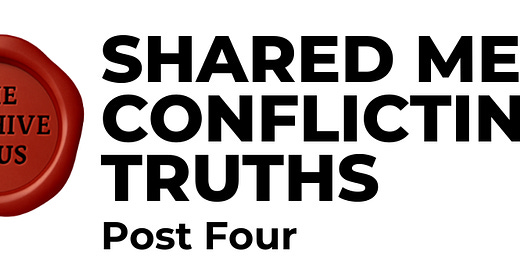Here’s the thing no one likes to talk about when it comes to memory:
Sometimes we remember things differently.
Same moment. Same room.
Different truths.
And that’s not always a problem—it’s just part of the work.
Memory Is Personal, Even When It’s Shared
You remember the joy.
Your sibling remembers the tension.
You remember your grandmother’s warm hands.
Someone else remembers the sharpness in her tone.
And you’re both right.
Memory isn’t just about what happened.
It’s about where we stood, who we were, what we felt, what we feared, what we wanted to be true.
So What Do We Do With That?
When memories conflict, we have a choice: We can fight to be “right.”
Or we can listen for the layers.
Here are a few ways to navigate shared memories:
1. Stay Curious
Ask:
“What do you remember about that day?”
“What stood out to you most?”
“How did you feel when that happened?”
Let memory be a conversation, not a courtroom.
2. Don’t Demand Agreement
It’s okay if everyone doesn’t remember it the same way.
It’s okay if you don’t even know what’s true anymore.
Hold space for contradiction.
3. Acknowledge Emotional Truths
You can say:
“I didn’t experience it that way, but I believe you.”
“Thank you for trusting me with your version.”
“That makes sense, knowing what you were going through.”
4. Let the Memory Expand
Conflicting memories don’t cancel each other out.
They fill in the gaps. They make the moment whole.
Sometimes, hearing another version helps you remember more—or understand yourself better.
Memory Work in Community
If you’re collecting family or community memories, here’s what helps:
Group Interviews: Let people riff off each other. Record the tension. It’s real.
Open Archives: Invite multiple submissions about the same event.
Footnotes & Layers: “Here’s how my uncle remembered it. Here’s how I do.”
Let Silence Speak: Not everyone will want to share. That, too, is part of the story.
Prompt for Reflection
What’s one memory you know others would remember differently?
What parts of your story do you keep private, and why?
Can you hold two truths at once?
Next Post:
Sacred Archives & Digital Shrines: Where Do We Keep What We Remember?
If this one stirred something in you—journal it. Don’t rush to resolve it. The truth doesn’t always come in a straight line. Sometimes, it spirals back in time.





